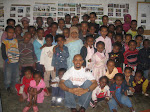Via:Voanews.com
By: Angel Tabe
Our series this week focuses on the increasing number of Africa’s children who are making their homes in the streets of major cities across the continent. So why does the problem exist and why is it getting worse? What is being done to help homeless children?
Assefa Bequele is the executive director of the African Policy Forum, an advocacy center in Ethiopia. VOA English to Africa reporter Angel Tabe asked him why children end up living on the streets. “The breakdown of family structures, for example the rising level of divorce, poverty, school system not progressing, orphans as a result of the AIDS pandemic, communities have failed to provide a conducive ecology for families and the state, to provide for the basic needs of its people.”
The absence of the above factors which Bequele describes as all important for the survival of children has forced children to resort to irregular trade, dangerous sex, and becoming vulnerable, even to those who are supposed to protect them like law enforcement officers. Bequele says, “Indeed, the officers are not the best friends these children can have, viewed by some as a potential danger, so we need to think about a child-friendly environment.”
Despite a vibrant NGO community working for the welfare of children, Bequele says it’s practically a drop in the ocean when you consider the dimension of the problem. “You can hardly expect it to be addressed through the kind action and generosity of small NGOs however good their work may be. It requires community action and large scale government intervention.” Already, he adds, African governments recognize the need for child protection, but there is a huge gap between rhetoric and reality. “Given resources available, the burden is quite enormous. Quite frankly, children are not a priority. Yes we love our children, but much remains to be done putting children on the public agenda.”
Bequele shares his recommendation. “At the end of the day, the family is the best source of protection for children. We should carry out long term measures to strengthen the family e.g. job creation, combating high mortality rates, universal education. For the short term, pressure the most important actors so that urban development has children at the center of the policy paradigm. Local governments, municipalities, city administrations should ask themselves the question: What are we doing to ensure that children are catered to, to make the city a zone of peace?”
Click here to listen to the interview with Assefa Bequele
Wednesday, May 09, 2007
Subscribe to:
Post Comments (Atom)


No comments:
Post a Comment